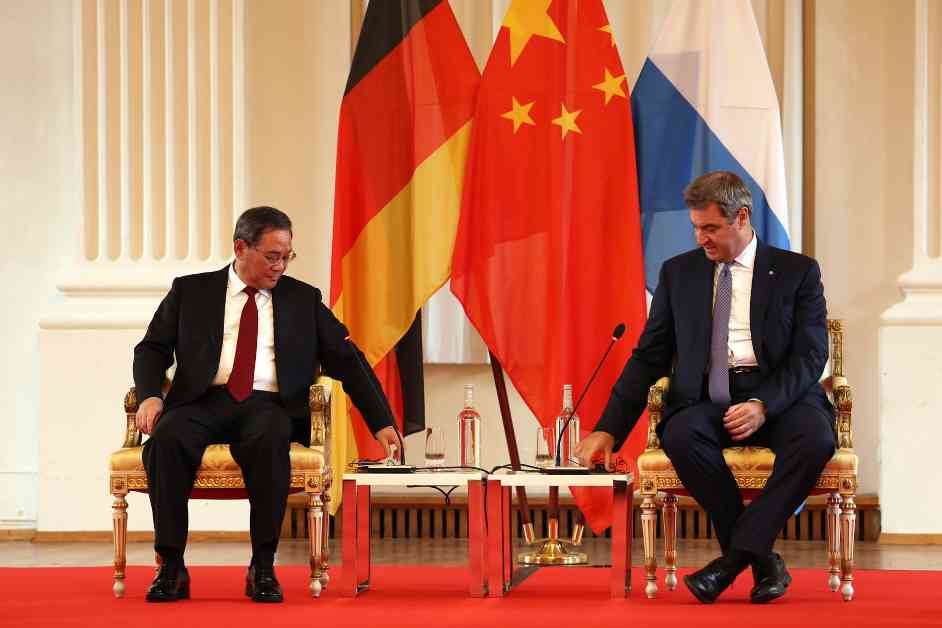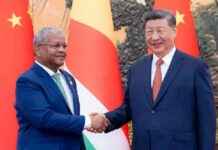China’s Relationship with Europe: De-Risking Strategies and Impacts
In the realm of European Union (EU) Commission and member states’ discussions concerning China, the concept of “de-risking” has taken center stage. This approach, distinct from “decoupling,” aims to reduce risks and strategic dependencies in Europe’s relationship with China. By leveraging the EU’s economic defenses more effectively and engaging in transparent dialogue, European nations seek to maintain cooperation and economic ties deemed low-risk.
Germany, as China’s largest trading partner in Europe, plays a pivotal role in shaping the region’s approach to Beijing. The unveiling of Berlin’s Strategy on China on July 13 highlighted the urgent need for de-risking. With significant Chinese investment flowing into Germany, particularly in industries like automotive, the country’s stance towards Beijing influences its neighbors’ policies. While the Strategy serves as a guiding document rather than a comprehensive policy blueprint, it sets the tone for Brussels and European capitals as they navigate their relationship with China.
European Commission President Ursula von der Leyen emphasized that de-risking involves economic, diplomatic, and geopolitical considerations. However, the European Council’s focus in June primarily centered on economic security concerns. The Commission’s risk assessment in October targeted critical sectors like semiconductors, AI, quantum computing, and biotech that are relevant to the EU’s exports to China. Despite some member states’ reluctance, the assessment was a crucial step in understanding and mitigating risks in EU-China relations.
The discrepancies between the Commission and member states underscore the complexity of defining and implementing de-risking strategies. While consensus exists on the challenges posed by EU-China relations, the post-pandemic approaches to engaging with Beijing vary across European nations. With Germany’s unveiling of its China Strategy, the debate on de-risking China has gained momentum, prompting discussions on the practical implications of this approach.
The Impact of De-Risking on Economic Relations
One of the primary areas affected by de-risking strategies is economic relations between Europe and China. As Europe seeks to diversify its supply chains and reduce dependency on Chinese markets, the focus shifts towards fostering resilient economic ties that are less susceptible to geopolitical tensions. This shift has led to a reevaluation of existing trade agreements and investment partnerships, with a growing emphasis on promoting reciprocity and fair competition.
The economic implications of de-risking are particularly significant for industries heavily reliant on Chinese imports or exports. The automotive sector, for instance, has long been a key player in EU-China economic relations, with German automakers holding a substantial market share in China. As countries like Germany recalibrate their approach towards Beijing, the automotive industry faces challenges in navigating new trade dynamics and regulatory frameworks.
Moreover, the technology sector, including semiconductors, AI, and quantum computing, is at the forefront of de-risking efforts due to its strategic importance and potential vulnerabilities. European countries are increasingly recognizing the need to bolster their domestic capabilities in these areas to reduce dependency on Chinese technology and mitigate security risks. This shift towards self-sufficiency is reshaping the dynamics of technological innovation and collaboration between Europe and China.
The Diplomatic and Geopolitical Implications of De-Risking
Beyond economic considerations, de-risking strategies also have significant diplomatic and geopolitical implications for Europe’s relationship with China. The emphasis on open and transparent dialogue aims to foster mutual understanding and cooperation while addressing areas of contention. However, navigating political sensitivities and power dynamics in EU-China relations requires a nuanced approach that balances strategic interests with diplomatic engagements.
The European Council’s focus on economic security in the context of de-risking highlights the interconnected nature of economic and political considerations. As European countries reassess their diplomatic engagements with Beijing, issues like human rights, cybersecurity, and territorial disputes come to the forefront. Balancing economic interests with ethical and political values poses a challenge for European policymakers seeking to de-risk their relationship with China.
Moreover, the geopolitical implications of de-risking extend beyond bilateral relations to regional and global dynamics. As Europe seeks to assert its strategic autonomy and strengthen its position in the international arena, the approach towards China becomes a litmus test for the EU’s credibility and influence. By adopting a principled yet pragmatic stance on de-risking, European nations aim to assert their values while safeguarding their economic and security interests in an increasingly complex geopolitical landscape.
The Road Ahead: Implementing De-Risking Strategies
As European countries navigate the complexities of de-risking their relationship with China, the road ahead is fraught with challenges and opportunities. The release of Germany’s China Strategy has catalyzed discussions on the practical implications of de-risking and the need for a coordinated approach among EU member states. While consensus on the urgency of de-risking exists, translating this consensus into concrete actions requires strategic planning and collaboration.
One key aspect of implementing de-risking strategies is enhancing resilience in critical sectors like technology, finance, and energy. By investing in domestic capabilities and fostering innovation, European countries can reduce their dependency on Chinese markets and safeguard their strategic interests. This shift towards self-reliance is crucial for ensuring long-term stability and security in EU-China relations.
Furthermore, promoting transparency and accountability in economic engagements with China is essential for mitigating risks and building trust. By upholding ethical standards and promoting fair competition, European nations can create a level playing field that benefits both parties. This approach fosters a more sustainable and mutually beneficial relationship, while reducing vulnerabilities to external pressures and disruptions.
In conclusion, de-risking Europe’s relationship with China is a multifaceted and complex endeavor that requires a comprehensive and coordinated approach. By addressing economic, diplomatic, and geopolitical considerations, European countries can navigate the challenges posed by EU-China relations and foster a more resilient and mutually beneficial partnership. The road ahead is paved with opportunities for innovation, collaboration, and strategic planning, as Europe seeks to assert its values and interests in an evolving global landscape.









![Indie music fans gather at l’Antipode for [Face B] Kool Things soirée on Saturday night news-15112024-105933](https://shanghainewstv.com/wp-content/uploads/2024/11/news-15112024-105933-218x150.jpg)







